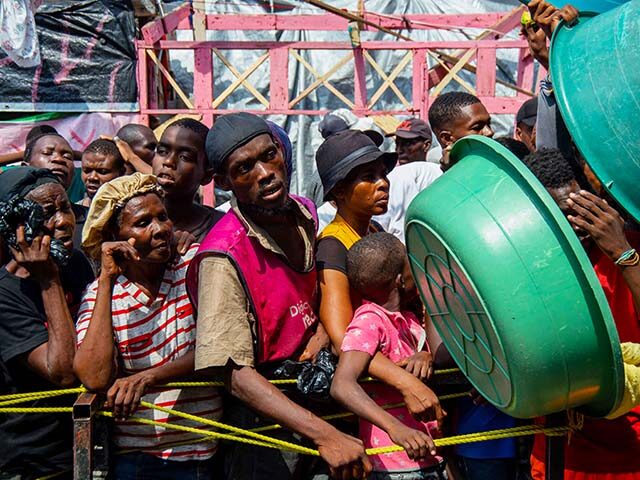Haiti’s prime minister, Garry Conille, traveled to Kenya and the United Arab Emirates (UAE) on Saturday to plead for security assistance after a vicious gang attack on the farming town of Pont-Sonde on Thursday killed at least 70 people and displaced 6,000 more.
Pont-Sonde is located in western Artibonite, Haiti’s breadbasket farming region. The gangs that overran the capital of Port-au-Prince after the assassination of President Jovenel Moise in July 2021 are sending thugs and raiding parties into the Artibonite Valley, kidnapping and murdering farmers in extortion plats, or to cut off the supply of food to rival gangs.
On Thursday morning, a swarm of gangsters equipped with automatic rifles tore through the town of Pont-Sonde, setting fire to dozens of homes and gunning down everyone in their path. The 70 fatalities reportedly included at least ten women and three infants.
Gang leader Luckson Elan, leader of the Gran Crif gang, claimed responsibility for the massacre. He said the Haitian government and the people of Pont-Sonde were “responsible” for the attack because they have allowed members of his organization to be killed. Pont-Sonde, whose major crop is rice, lies within the “territory” claimed by Gran Crif.
“It’s Pont-Sonde residents who are at fault. What happened in Pont-Sonde is the fault of the state,” insisted Elan, who was sanctioned by the U.S. government and United Nations in September for human rights abuses in the Artibonite region.
The U.N. said the “violence and depths of cruelty” displayed by gangs like Gran Crif was “unprecedented,” including “indiscriminate attacks against the population,” “obstruction of humanitarian assistance,” and “sexual and gender-based violence,” including rape.
Prime Minister Conille said the “odious crime against defenseless women, men and children” perpetrated by Gran Crif in Pont-Sonde was “not only an attack against victims but against the entire Haitian nation.”
“To those who sow terror, I say this: you will not break our resolve. You will not subdue this people who have always fought for their dignity and freedom. We will never give up our right to live in peace, in security, and in justice,” Conille said.
“Law enforcement, supported by our international partners, is stepping up its response. We will continue to relentlessly pursue those who believe they can act with impunity. We will restore order and state authority everywhere,” he pledged.
The Haitian National Police said on Friday that its director in the Artibonite region has been replaced, and reinforcements were dispatched to “contain the situation.”
Observers from international humanitarian groups complained the police remained huddled in their stations and did nothing to stop the Pont-Sonde massacre, possibly because they were afraid to engage the heavily armed gang members.
“They were left to shoot anybody, everybody was running everywhere. They were walking, shooting people, killing people, burning people, burning homes, burning cars,” said Bertide Horace, spokesperson for the Dialogue and Reconciliation Commission to Save the Artibonite Valley.
Another human rights organization, RNDDH, said the true death toll from the attack would prove to be higher than 70 because entire families were slaughtered by the gangs, and not all of the corpses littering the streets have been identified yet.
Conille gave a press conference on his way out of the country in which he said Haiti is “being attacked on several fronts,” and needs international assistance to repeal the gang assault.
“As we attack one major neighborhood, gangs then spread out and attack us in other places, so our police chief has to make a very difficult decision of redeploying his assets. You can understand why four months into this, we’re not yet finished with one neighborhood,” he said.
“Every house is transformed into a trap, and you have the gangs putting holes in walls and shooting from these tight holes. It’s really a house-to-house operation for the police with high-risk engagement. And then once you finish this engagement, you need to consolidate, which means that you need to bring in the state very quickly,” he explained.
“One of the aims of this trip is to go to Kenya to discuss with President Ruto how we can speed up the deployment of remnants of the Kenyan troops as quickly as possible to continue supporting the national police force,” Conille said.
President William Ruto of Kenya is the only leader to pledge a significant number of ground forces for peacekeeping in Haiti to date, and even Kenya has only sent 400 police to date, over strenuous objections from opposition leaders who said Ruto lacked the constitutional authority to order such a deployment.
Ruto said during a visit to Port-au-Prince last month that he would send another 600 officers. Guatemala has pledged 150 officers, and a few have come from Jamaica and Belize, but the force remains far short of the 2,500 envisioned by the United Nations.
Haiti has about 7,000 police officers, but Conille admitted that only about 20 percent of them are deployable troopers. This force faces over 200 gangs, some of whom have forged alliances with international drug traffickers and arms dealers.

COMMENTS
Please let us know if you're having issues with commenting.